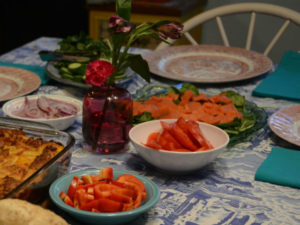EATING HEALTHY THROUGH THE HOLIDAYS
As posted to the Canadian Jewish News:
By: Dr. Deborah Mechanic
September 3, 2018

Whether it’s Christmas dinner or the first night of Rosh Hashanah, big heavy family meals are notorious for their after effects. Extreme bloating and fullness are reoccurring themes on many TV shows, like Joey’s Thanksgiving pants on Friends, or post-turkey drowsiness getting checked out by MythBusters. The fact is, holiday meals have become infamous for physical discomfort, weight gain, or bloating following them, in one sense or another.
The high holidays are a marathon of family dinners strung together, are often joked about as a bad time to start a diet, and the extra perk? With most of the Jewish holidays, dinners come in pairs of two.
In fact, the relationship between food and holidays is so notorious that the government of Canada has created a website where they’ve complied ideas for getting ahead of the problem. The site outlines tips for staying healthy during holiday meals, as well as advice and alternatives for making traditional foods healthier. (For example, when making stuffing, switch to whole grain breads or quinoa). While many now have their methods for staying healthy during the regular work week, some are at a loss for what to do when the meals are more decadent. Here are my helpful suggestions:
Colour Colour Colour
Loading half of your plate with vegetables before you consider the other foods on the table will help ensure that you minimize the heavier foods’ real estate on your plate, and therefore in your meal. Carbohydrates in large quantities will cause bloating and fatigue, and will not keep you full for very long. Marsha Fenwick, Hollistic Nutritionist, notes that a good method to ensure you fill up on veggies first is to start with a salad appetizer before the meal.
Having a variety of coloured vegetables in your meals is good practice on a day-to-day basis too. The different colours are created by different pigments that can be used to build vitamins, minerals, or antioxidants in the body. For example, the orange in carrots, sweet potatoes etc. is created by beta carotene, from which the body makes Vitamin A, needed for vision.
Eating throughout the day
It’s a common misconception that fasting all day and “saving room” when a big meal is waiting in the evening is the right approach. This can alter how your body digests food and put you at a disadvantage, as well as create some physical discomfort immediately after eating. On the flip side, you should also not be eating more frequently during the days of the holiday. Fenwick recommends sticking to your regular eating schedule with a focus on proteins and water intake. The bottom line is to maintain your routine eating habits, and consume high quality, nutrient dense foods, and hydrate.
Enjoy special foods
The holidays come with traditional foods that we really only see once a year – old family recipes that have been passed through generations, like cheese cake, or latkas. There is no crime in enjoying these foods. In fact, it’s preferable to have a slice of Grandma’s Rosh Hashanah apple pie, when compared to the cookie platter sitting next to it – a food you can get any time. Indulging for the holiday is okay, and understanding that it’s a treat helps with the mentality that the food you’re eating is not the norm, which can make a big difference.
Stay Active
Staying active is important to process any extra holiday calories consumed. Getting moving can also help combat the sluggishness that comes after a large meal, colloquially known as “Itis”. It’s also important to keep all systems performing well – for example: improving blood flow. It’s important to note that activity will be effective at helping the body process a holiday dinner, but should not be used to compensate for a generally poor or excessive diet.
A note on fasting:
Yom Kippur is a time for self reflection and intense spirituality. Typically, following the 25 hour fast, a meal is prepared and enjoyed by families. This meal should be treated differently than other holiday meals, as the body has just come out of what some may call a cleansing state. Keeping meals light, fresh, and not loaded with dense or heavy foods – foods that are commonly seen at other holiday meals – will help keep the stomach from becoming overwhelmed. It’s also important to ensure you increase your water intake in the days leading up to the fast.
The holidays, whether it’s Thanksgiving or Rosh Hashanah, are a common time for people to spoil themselves and indulge. Maintaining a healthy diet, with consistent meals and regular activity, is key to creating a healthy foundation for these indulgent times.
